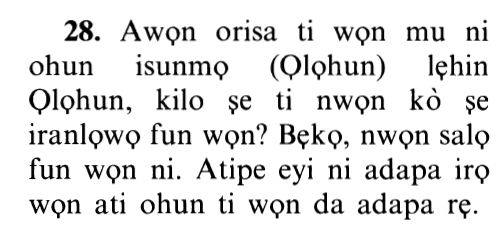46vs28
Select any filter and click on Go! to see results
فَلَوْلَا نَصَرَهُمُ الَّذِينَ اتَّخَذُوا مِن دُونِ اللَّهِ قُرْبَاناً آلِهَةً بَلْ ضَلُّوا عَنْهُمْ وَذَلِكَ إِفْكُهُمْ وَمَا كَانُوا يَفْتَرُونَ
Falawla nasarahumu allatheena ittakhathoo min dooni Allahi qurbanan alihatan bal dalloo AAanhum wathalika ifkuhum wama kanoo yaftaroona
Click to play
Yoruba Translation

Hausa Translation
To, don mħne ne waɗanda suka riƙa, baicin Allah, abũbuwan yi.wa baiko, gumaka, ba su taimake su ba ? ôa, sun ɓace musu Kuma wannan shi ne ƙiren ƙaryarsu da abin da suka kasance sunã ƙirƙirãwa.
Asbabu n-Nuzuul (Occasions of Revelation)
Allah then says,
وَلَقَدْ أَهْلَكْنَا مَا حَوْلَكُم مِّنَ الْقُرَى ...
And indeed We have destroyed towns round about you,
This is addressed to the people of Makkah.
Allah destroyed the nations who disbelieved in the Messengers who lived around Makkah, such as
*
`Ad who were at Al-Ahqaf in Hadramawt near Yemen,
*
Thamud whose dwellings were between Makkah and Ash-Sham (Greater Syria),
*
Saba' who were in Yemen,
*
the people of Madyan who were on the route and passage to Ghazzah (Western Palestine), and
*
the people of Lut who dwelt by the lake (the Dead Sea) which they used to pass by (on the way to Jordan) as well.
Allah then says,
... وَصَرَّفْنَا الْآيَاتِ ...
and We have shown (them) the signs in various ways,
meaning, `We explained and clarified them.'
... لَعَلَّهُمْ يَرْجِعُونَ ﴿٢٧﴾
فَلَوْلَا نَصَرَهُمُ الَّذِينَ اتَّخَذُوا مِن دُونِ اللَّهِ قُرْبَانًا آلِهَةً ...
so that perhaps they might return.
As for those whom they had taken for gods besides Allah, as the means of approach to Him, why then did they not aid them?
meaning, did they help them when they were in the greatest need for them?
... بَلْ ضَلُّوا عَنْهُمْ ...
but they vanished completely from them.
Rather, they completely left them alone when they needed them the most.
... وَذَلِكَ إِفْكُهُمْ ...
And that was their falsehood, (meaning, their lie).
... وَمَا كَانُوا يَفْتَرُونَ ﴿٢٨﴾
and what they were fabricating.
which means that they fabricated lies by taking them as gods, and they lost and failed in their worship of them and their reliance upon them -- and Allah knows best.
" فلولا نصرهم الذين اتخذوا من دون الله قربانا آلهة " أي فهل نصروهم عند احتياجهم إليهم ؟ بل ضلوا عنهم أي بل ذهبوا عنهم أحوج ما كانوا إليهم " وذلك إفكهم " أي كذبهم " وما كانوا يفترون" أي وافتراؤهم في اتخاذهم إياهم آلهة وقد خابوا وخسروا في عبادتهم لها واعتمادهم عليها والله أعلم .
"فلولا" هلا "نصرهم" بدفع العذاب عنهم "الذين اتخذوا من دون الله" أي غيره "قربانا" متقربا بهم إلى الله "آلهة" معه وهم الأصنام ومفعول اتخذ الأول ضمير محذوف يعود على الموصول أي هم وقربانا الثاني وآلهة بدل منه "بل ضلوا" غابوا "عنهم" عند نزول العذاب "وذلك" أي اتخاذهم الأصنام آلهة قربانا "إفكهم" كذبهم "وما كانوا يفترون" يكذبون وما مصدرية أو موصولة والعائد محذوف أي فيه
" لولا " بمعنى هلا , أي هلا نصرهم آلهتهم التي تقربوا بها بزعمهم إلى الله لتشفع لهم حيث قالوا : " هؤلاء شفعاؤنا عند الله " [ يونس : 18 ] ومنعتهم من الهلاك الواقع بهم . قال الكسائي : القربان كل ما يتقرب به إلى الله تعالى من طاعة ونسيكة , والجمع قرابين , كالرهبان والرهابين . وأحد مفعولي اتخذ الراجع إلى الذين المحذوف , والثاني " آلهة " . و " قربانا " حال , ولا يصح أن يكون " قربانا " مفعولا ثانيا . و " آلهة " بدل منه لفساد المعنى , قال الزمخشري . وقرئ " قربانا " بضم الراء .
I'raab - grammatical analysis of the Qur'an
«فَلَوْ لا» الفاء حرف استئناف ولولا حرف تحضيض.
«نَصَرَهُمُ» ماض ومفعوله.
«الَّذِينَ» فاعله والجملة مستأنفة.
«اتَّخَذُوا» ماض وفاعله.
«مِنْ دُونِ» متعلقان بمحذوف حال.
«اللَّهِ» مضاف إليه.
«قُرْباناً» حال والجملة صلة.
«آلِهَةً» مفعول به ثان للفعل اتخذوا.
«بَلْ» حرف عطف.
«ضَلُّوا» ماض وفاعله.
«عَنْهُمْ» متعلقان بالفعل والجملة مستأنفة.
«وَذلِكَ» الواو حرف استئناف ومبتدأ.
«إِفْكُهُمْ» خبر والجملة الاسمية مستأنفة.
«وَما» معطوفة على إفكهم.
«كانُوا» كان واسمها.
«يَفْتَرُونَ» مضارع مرفوع والواو فاعله والجملة خبر كانوا.
